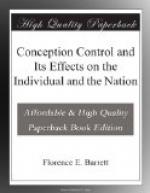To many the introduction of this aspect of the question may seem beside the mark. For them the practical question in a world of sense is how to avoid having children when for any reason they are not wanted, and yet leave unimpaired facilities for married life. It is true the problem is not always stated so bluntly. The uses of contraceptives are explained, together with a recommendation for moderation in physical intercourse; but as will be shewn below, if such moderation is really practised, it is possible to live a natural married life such as renders unnecessary the use of artificial contraceptives with all their attendant evils and yet limit the size of the family.
But it is necessary to consider more carefully the claim made to-day that contraceptives are both necessary and harmless, and that public propaganda on the subject is desirable.
There are several different groups for whom relief is claimed:—
1. Women who are suffering from chronic or from temporary ill-health are frequently not in a condition to bear the strain of child-bearing, and indeed it may become a real danger to their future health, either mental or physical.
2. There are cases of inherited disease, mental or physical, which ought to prohibit child-bearing.
3. There are over-worked women whose daily work, added to child-bearing, destroys their health and vitality. These people are found not only among the so-called working classes; the same conditions with somewhat different types of strain are found in wives of professional men with very slender incomes.
4. Some parents wish to “space” their children, that greater attention may be given to each, or they wish to limit the number of their family on account of financial and other difficulties.
With these and other considerations in view, the widespread teaching of methods of preventing conception is advocated because it is claimed:—
(a) That except for general propaganda, the greatest sufferers, viz., poor women with constantly recurring pregnancies, would otherwise never learn of any method of relief.
(b) That many young people who for various reasons, such as housing or financial difficulties or inherited disease, feel themselves unable to have a family, would if such knowledge were available marry much earlier, and their natural desires would be satisfied, while apart from marriage they might resort to promiscuous intercourse.
(c) That homes where the growing difficulties and strain of a continually increasing family are leading to estrangement between husband and wife, are restored to happiness when saved from the difficult choice between continence, which they have never trained themselves to practice, or many children with which they cannot cope.
There are, however, serious fallacies in these contentions.
The propagandists of conception control appear to take it for granted that after preventive measures in early youth, children may be conceived at will whenever they are desired; and, moreover, it is assumed that apart from such precautions every woman will conceive annually and will continue to do so until 10-12 children have been born.




